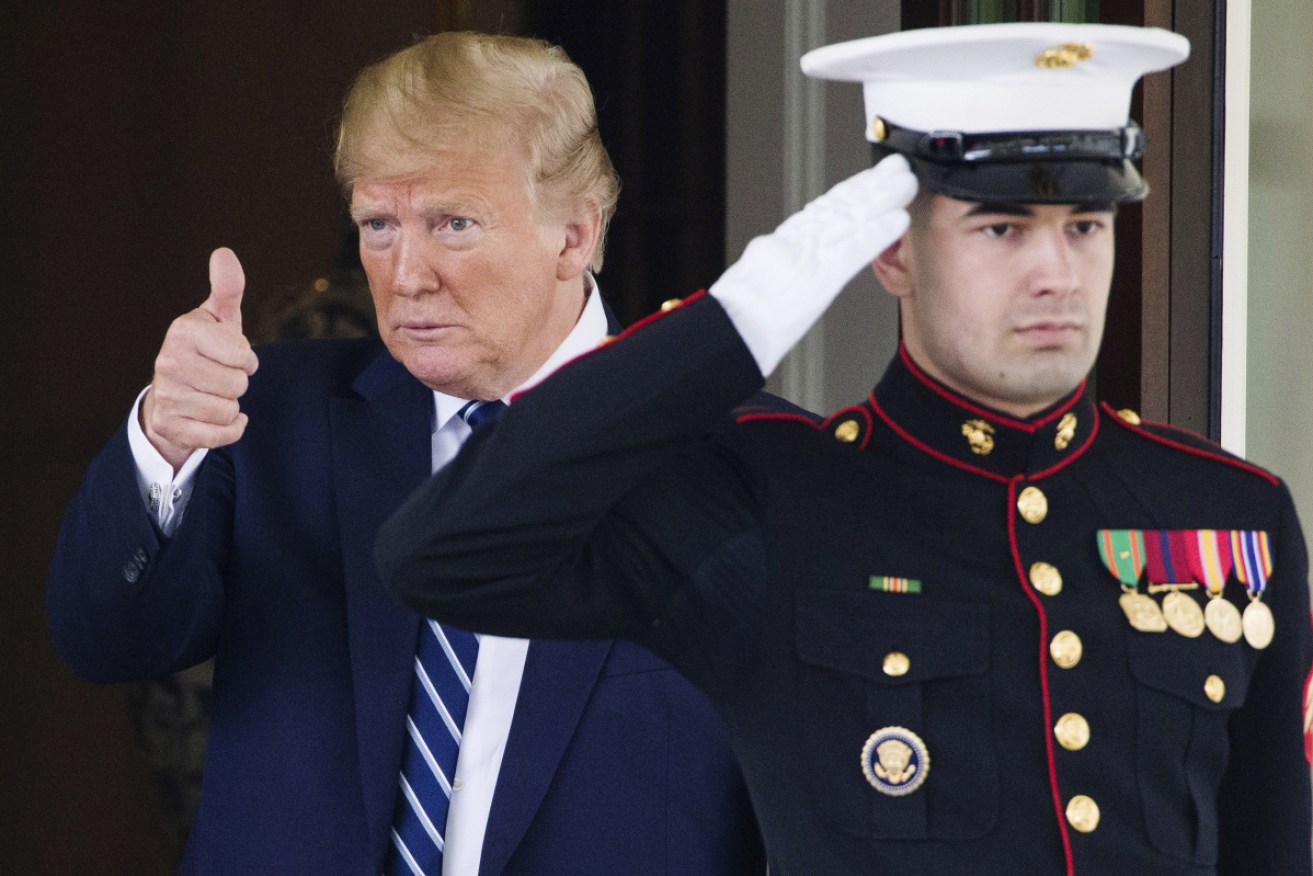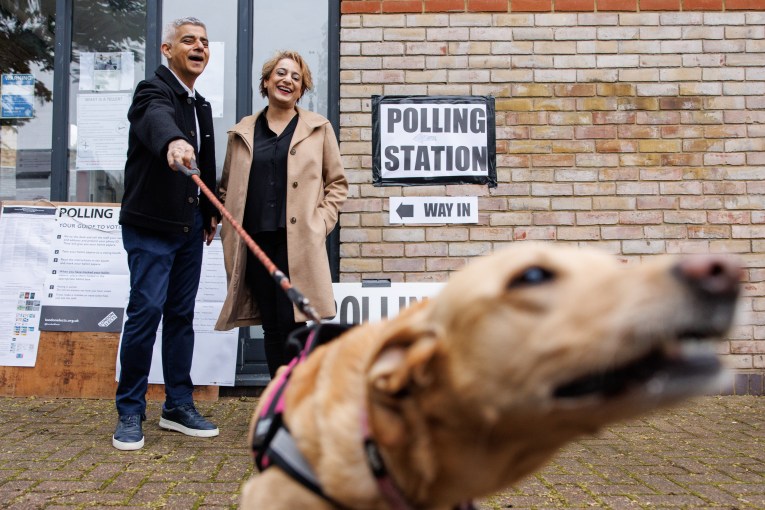US military was ‘cocked and loaded’ so why did Donald Trump call off strikes?


The US president told NBC News: 'I'm not looking for war, and if there is, it'll be obliteration like you've never seen before'. Photo: AAP
US president Donald Trump has tweeted why he called off strikes against Iran, saying his military had been “cocked and loaded” before he asked one key question.
“How many will die?” Mr Trump claims he asked his military officials before a general replied: “150 people, sir”.
With only ten minutes to spare before the US air force was scheduled to take off, Mr Trump tweeted that he aborted the mission because he believed the loss of life would be “not proportionate”.
“We were cocked & loaded to retaliate last night on 3 different sights when I asked, how many will die. 150 people, sir, was the answer from a General,” Mr Trump tweeted.
“Ten minutes before the strike I stopped it, not proportionate to shooting down an unmanned drone. I am in no hurry, our military is rebuilt, new, and ready to go, by far the best in the world.”
….On Monday they shot down an unmanned drone flying in International Waters. We were cocked & loaded to retaliate last night on 3 different sights when I asked, how many will die. 150 people, sir, was the answer from a General. 10 minutes before the strike I stopped it, not….
— Donald J. Trump (@realDonaldTrump) June 21, 2019
The counter attack on three targeted sites – Iranian radar and missile batteries – was prepared in retaliation to the Iranians shooting down an unmanned American spy drone this week which Iran says took place over its territory.
Washington said it occurred in international airspace over the strategic Strait of Hormuz.
The decision to cancel suggests Mr Trump preferred a diplomatic solution to end weeks of tension with Iran.
Iranian sources told Reuters that Mr Trump had warned Tehran via Oman that a US attack was imminent, but had said he was against war and wanted talks.
Washington also requested a closed-door UN Security Council meeting on Monday.
The State Department denied the Reuters report: “Reports that a message was passed last night to the Iranians via an Omani back channel are completely false. These reports are pure Iranian propoganda,” department spokeswoman Morgan Ortagus said on Twitter.

The Nimitz-class aircraft carrier USS Abraham Lincoln and the Wasp-class Amphibious Assault Ship USS Kearsarge in the US 5th Fleet area of operations in the Persian Gulf. Photo: US Central Command
Mr Trump’s last-minute decision-making was revealed in a combination of early morning tweets and an interview on NBC News on Friday.
Mr Trump told NBC the planes were not in the air “but would have been pretty soon” when he chose to keep them grounded on Thursday.
“They came and they said ‘Sir, we’re ready to go we’d like a decision’,” Mr Trump told Meet the Press journalist Chuck Todd.
“I said, ‘I want to know something before you go. How many people will be killed? In this case, Iranians.They said, ‘Sir, approximately 150′.
“I thought about it for a second and I said, ‘You know what, they shot down an unmanned drone, plane, whatever you want to call it, and here we are sitting with a 150 dead people that would have taken place probably within a half an hour after I said go ahead’, and I didn’t like it, I didn’t think, I didn’t think it was proportionate.
“I’m not looking for war, and if there is, it’ll be obliteration like you’ve never seen before. But I’m not looking to do that,” he said.
Mr Trump’s decision drew mixed reviews in Washington, with some people criticising him for flinching while others, notably senior Democrats, praised what they saw as restraint.
“A strike of that amount of collateral damage would be very provocative, and I’m glad the president did not take that,” House Speaker Nancy Pelosi, the top Democrat in Congress, told reporters.
However, former Pentagon officia Michael Makovsky, who heads the Jewish Institute for National Security of America (a think tank that favours strong US-Israeli security ties) said Mr Trump was undermining US credibility.
“Trump has given the impression he lost his nerve,” Mr Makovsky said in a statement.
Commercial airlines divert around Gulf of Oman
As tensions simmer, the US has barred American-registered aircraft from flying over Iranian airspace in the Persian Gulf and the Gulf of Oman.
Qantas has also announced its jetliners will go out of their way to avoid flying over the Strait of Hormuz and Gulf of Oman, with a Qantas spokeswoman saying the route change would remain in place until further notice.
The security measure will mean a change to Qantas flights between Australian and London, however it is understood the impact on flying time will be minimal.
Dutch airline KLM announced a similar measure on Friday, as did Malaysia Airlines and Singapore Airlines.
Qantas flights cross the Middle East at around 12,000km.
Escalating relations between the USA and Iran have also caused a rise in oil prices.
A White House spokesperson said Mr Trump spoke to Saudi Crown Prince Mohammed bin Salman about stability in the Middle East and the oil market.
“The two leaders discussed Saudi Arabia’s critical role in ensuring stability in the Middle East and in the global oil market,” White House spokesman Hogan Gidley said in a statement.
“They also discussed the threat posed by the Iranian regime’s escalatory behaviour.”
Mr Trump tweeted further that he was in “no hurry” to launch a strike and that US economic sanctions designed to force Iran to curb its nuclear and missile programs and its involvement in regional wars were having an effect.

This image released Friday by the US military’s Central Command shows what it describes as the flight path and the site where Iran shot down a US Navy RQ-4A Global Hawk in the Strait of Hormuz on Thursday. Photo: US Central Command
He said the US imposed extra sanctions against Iran on Thursday night following the destruction of the Global Hawk drone by an Iranian surface-to-air missile, but it was not immediately clear what those economic penalties may have been.
White House national security adviser John Bolton, Secretary of State Mike Pompeo and CIA Director Gina Haspel, along with the rest of Mr Trump’s team, favoured a retaliatory strike, a senior Trump administration official said.
“There was complete unanimity amongst the president’s advisers and DOD (Department of Defence) leadership on an appropriate response to Iran’s activities. The president made the final decision,” said the official, who spoke on condition of anonymity.
Iran’s destruction of the US drone was the latest among ever more serious incidents in the Gulf region, a critical artery for global oil supplies, since mid-May.
There have also been explosions on six oil tankers that the US suspects Iran or its proxies of carrying out. Iran has denied any involvement.
-with AAP








